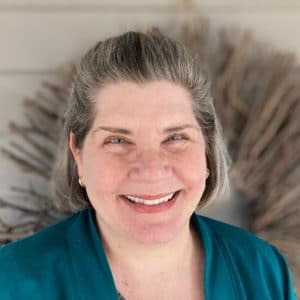Q- Where do you live?
A- I live outside of Portland, Oregon, in a suburban area called Oregon City, at the end of the Oregon Trail.
Q- How old were you when you were diagnosed with breast cancer?
A- I was about two months shy of my 53rd birthday when I got the news.
Q- What was/is your diagnosis?
A- I was diagnosed with stage 2 HR2+ ER+ invasive ductal carcinoma in my left breast.
Q- Can you describe some of the feelings that came with your diagnosis?
A- I was diagnosed in a small hospital east of Salem, Oregon. After a suspicious mammogram, I had a guided needle biopsy. As the doc was inserting the needle, he said, “Yeah, this is cancer. You’re gonna want to be sure to get this taken out.” I was so stunned and continue to be flabbergasted by this horrible situation. I did not continue my treatment at that hospital. I had the initial information that it was invasive ductal carcinoma, and that seemed simple enough to just have a lumpectomy and move along. (Ha!)
Q- Are you still in treatment? Or how long did treatment take?
A- My treatment took a year – the immunotherapy lasted 12 months.
Q- What type of treatment did you go through?
A- I had six rounds of chemo and immunotherapy followed by a double mastectomy. I was lucky to avoid radiation. After two years of AI inhibitors with significant side effects, I decided to stop taking them. I decided to live flat, so I have not had reconstruction.
Q- Tell us how you felt during treatment. In real words.
A- I documented all of the feelings and effects on my CaringBridge account if you want to see it (BrendaMarks). The chemo was progressively debilitating. Like many of us, losing my hair was horrible. My boss offered to shave her head in solidarity, and I was adamant for her not to. It was a very sweet gesture, but why should two of us be bald? After the fourth round, my treatment was delayed because I didn’t have enough blood to survive the next round. Eventually, I had the remaining treatments. One of the more challenging parts was having a port in my chest. This (and baldness for close to 8 months) was a daily visual reminder of my situation. Most notably, I hated the effects on my mouth and nose tissue. I had metal mouth, and although I had an appetite, I couldn’t eat. Then I had neuropathy in my feet and hands. (My acupuncturist was able to resolve most of it!) By the fifth and sixth treatment, my days were mostly spent in bed and listening to audio books. I listened to the same ones a few times since I’d drift off to sleep and didn’t have much attention to remember things anyway.
Q- Did you have any cravings?
A- I wanted sweets. (I usually want sweets!)
Q- Did anything completely turn you off?
A- I am usually sensitive to odors, and that seemed to be accentuated. I didn’t want to be around anything too smelly.
Q- Describe your support system during your journey.
A- This was a tender subject. I was married and the experience showed me that I didn’t want to rely on my (now ex-) husband. He was all but absent for me and focused on how this scenario was difficult on him. My other family lived an hour’s drive away and offered help when they weren’t traveling or busy. I had a few good friends who visited and distracted me during chemo treatments, and that is something I’ll never forget. At home, my dog was a constant and loving companion who gave me a lot of comfort.
Q- Have any of your relationships changed since experiencing breast cancer?
A- I very much appreciate those who listened to me and were available when I needed them. (I cut those friends more slack when they don’t always return my calls these days!) I got divorced. (That’s a long story for another day.) I had some friends who helped and became close when I was in treatment and have since disappeared. (That’s still confusing to me.)
Q- Have you gained new friends since your diagnosis?
A- Yes! My life has changed significantly, and I have made new friends along the way. I’m still looking for a great guy.
Q- Use some descriptive words to describe your breast cancer experience.
A- Challenging, overwhelming, difficult, clarifying, thought-provoking, painful, and in the end, healing.
Q- How has your life changed for the better since your diagnosis?
A- The situation helped discern what is important to me. I learned a whole lot of self-respect and significantly deepened my spiritual life. I am so grateful for my health now. I’m happy pretty much every day, even as I typed this while preparing to file taxes 😉

